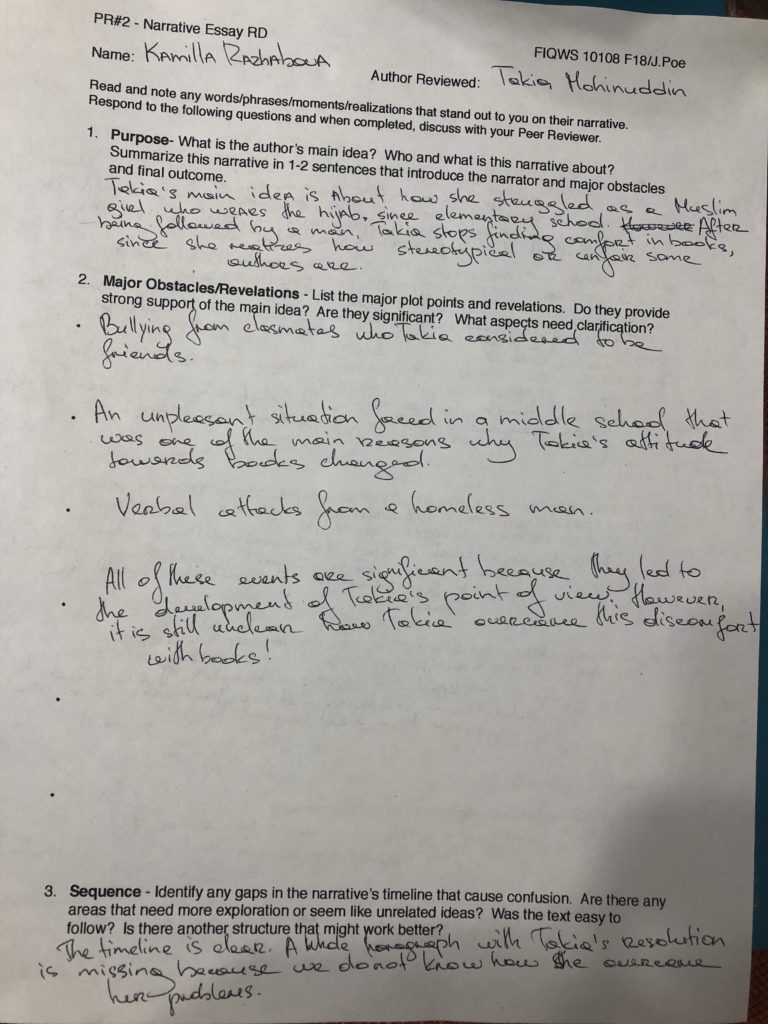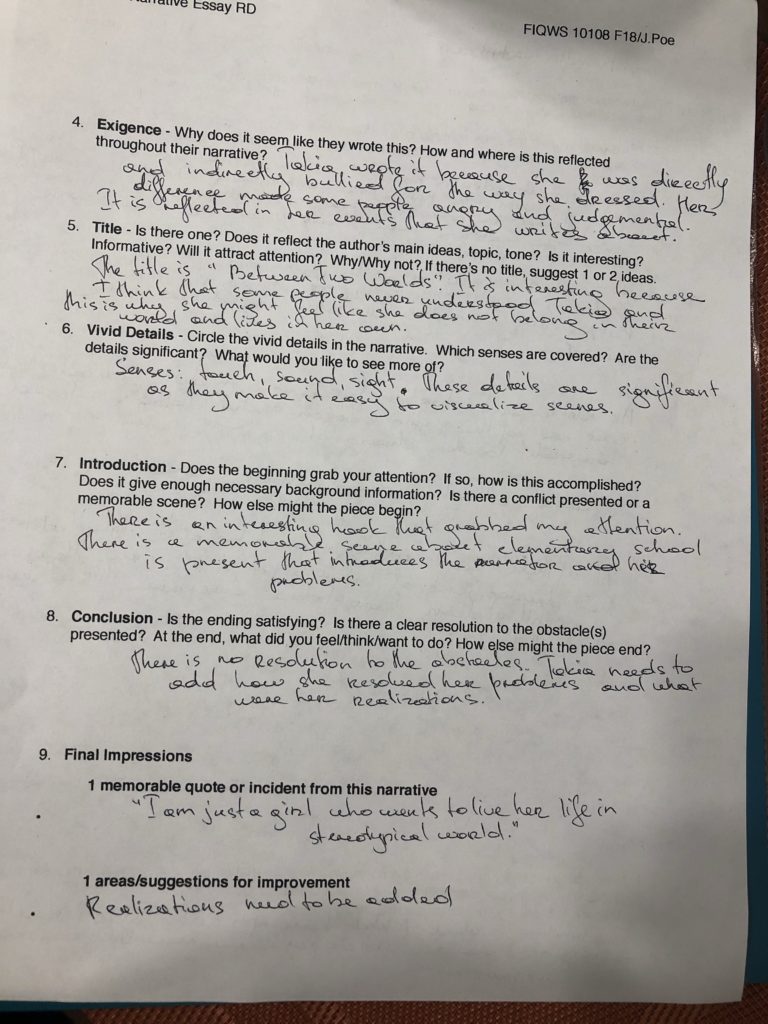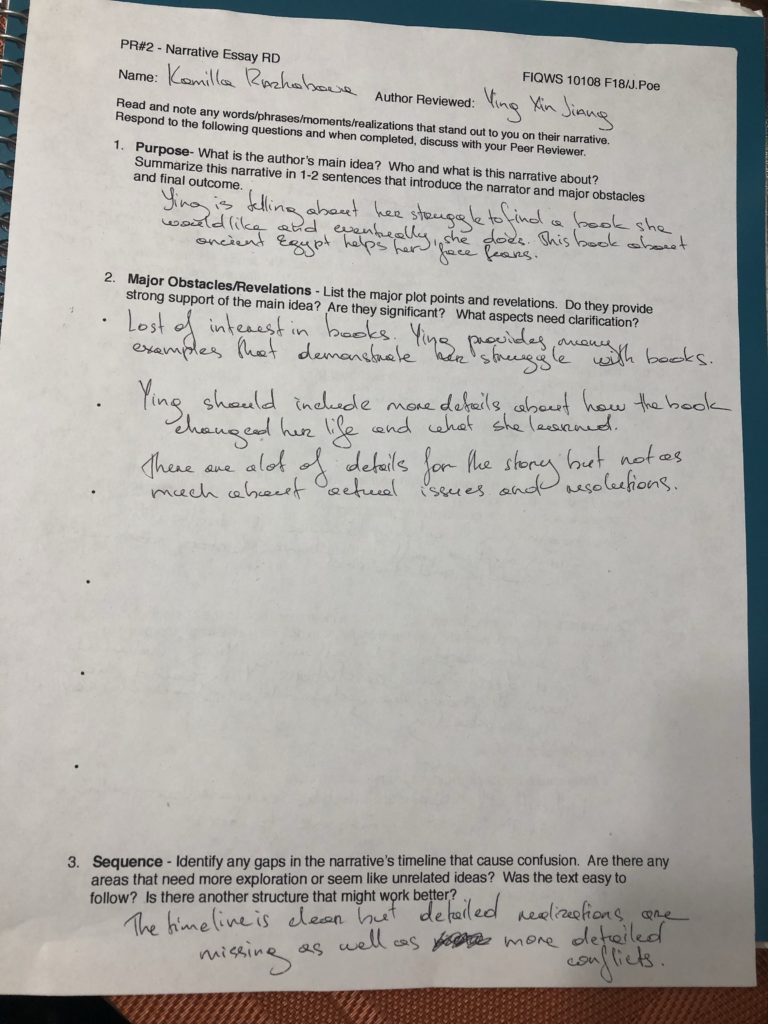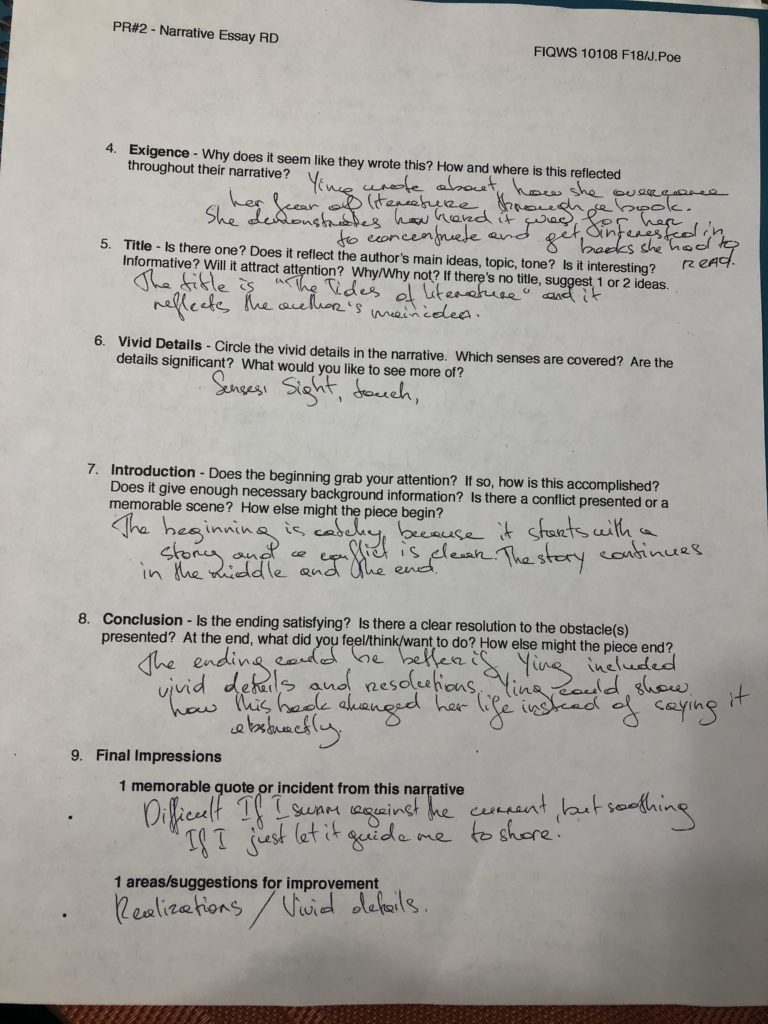How I have met the course learning objectives:
- I developed new strategies for reading, drafting, collaborating, revising, and editing.
- I explored and analyzed, in writing and reading, a variety of genres and rhetorical situations.
- I engaged in the collaborative and social aspects of this writing process by commenting on my classmates’ drafts and receiving comments from them.
My Literacy Narrative Essay:
Kamilla Razhabova.
09/24/18.
FIQWS 10108 HA16
A return to authenticity.
Throughout my life, I had a belief that life was something that was happening to me, rather than
something I could control. When facing challenges and obstacles, I would do my utmost to solve
them by taking certain actions only if I perceived those problems as changeable and simple.
However, every attempt to eliminate the roots of such problems as making friends, family
disputes, insecurities, and binge-eating resulted in the emergence of new complex problems. The
cycle of constant failures never seemed to stop until one evening when I was seeking comfort
and solutions on the internet, I came across a compelling quote,“The bird fights its way out of
the egg. The egg is the world. Who would be born must first destroy a world.”, that sparked my
curiosity. Later that evening, I found out that the quote was taken from a book called Demian by
Hermann Hesse, which paved the way to my self-realization.
Emil Sinclair, the main character, is going through several stages of his personal
development until he is harmonized with his inner self. At the beginning of Demian , Sinclair
meets his negative self, Kromer, who is a local bully. Sinclair lies about a committed crime
because he desires to be noticed. Kromer blackmails Sinclair to benefit and get some money
from him, while Sinclair gets trapped in the “forbidden realm” created in his childhood. Sinclair
experiences depression, despair and mental breakdowns as he searches for a way to return to “the
world of light” which consists of his family members.
Just like Emil Sinclair, I lied about my beliefs, goals and aspirations in order to be accepted
by my classmates. In 10th grade, I was known as a nerd who always helped everyone with their
assignments. After school, I spent hours sitting in a cold dark room, doing my own and friends’
homework. I did math problems for them, and they did not express their gratitude. Later on, I
found out that they spread rumors behind my back. Soon enough, I realized that I could not enjoy
eating my mother’s pasta anymore because I completely lost my appetite after hearing about the
rumors. I developed a judgemental attitude towards people, since I assumed that everyone
despised me. On my way to school, I would imagine getting in an accident, so that I wouldn’t
have to pretend to be someone else one more day. My supportive and loving family was one of
the major reasons I kept moving forward and excel academically.
Everything changes when Sinclair meets Demian who represents his higher self. Demian
questions beliefs, socially accepted norms and the reality he lives in. Demian’s perception of
reality amazes and frightens Sinclair whose life falls apart as a result of his self-growth. Sinclair
reunites with Demian at different stages of his self-realization as well as meets other individuals
who guide him. “The bird fights its way out of the egg. The egg is the world. Who would be born
must first destroy a world.”In this quote, the egg represents the bubble constructed by society
and the bird is Sinclair. In order to find himself, he must break free of social labels and
limitations. Finally, the path to self-discovery ends when Sinclair realizes that Demian has
always been a part of himself and the illusory bubble pops up.
I remember being amazed at how much Sinclair’s story resonated with me. I had the urge to
highlight every sentence, hoping the story would never end. Sinclair says, “I couldn’t manage to
share in the joys and activities of those my age, and I had often been consumed with
self-reproaches and worries, as if I were hopelessly cut off from them, as if I were shut off from
life”. His words became rooted in my subconscious mind and his further actions served as the
first steps I took to completely change my life. I began reading self-help books, applying
techniques successful famous people used and meditating. Through meditation, I achieved a high
level of mindfulness as well as overcame depression and anxiety attacks. As I was
reprogramming my mind, reality changed accordingly.
Hermann Hesse’s novel became my salvation. I faced my fears. I faced my problems,
created as a result of my own negative thoughts. I faced my self-hatred, developed as a result of
my inability to express myself, and replaced it with self-love. I was reborn and felt truly alive for
the first time in my life. With my self-discovery, I realized the importance of visualizing stories I
read and connecting to main characters. By imagining the setting of a story, I enhanced my five
senses and started visualizing resolving my own problems. Hundreds of lessons have been
learned after reading Demian, but I will always remember the warmth in my chest when I first
realized that I and only I have the power to change my life in any moment.
My Revised Literacy Narrative Essay:
Kamilla Razhabova.
10/25/18. Revised
FIQWS 10108 HA16
Awakening The Lion Within.
Insecurities are an integral part of the human character. I have always been an insecure person. I would attempt to unravel my binge-eating disorder problem and my family and friends problems by pretending to be on top of the world, trapping my fragile insecure self behind this mask of a confident person at the same time. Little did I know, on that day, when I went around in circles, searching for the right path to my new high school, I would come across a compelling quote on a website, “The bird fights its way out of the egg. The egg is the world. Who would be born must first destroy a world.” that sparked my curiosity. Later on that unfortunate day, feeling shivers run down my spine, I found out that the quote had belonged to a book called Demian by Hermann Hesse. At that moment, I stepped on the path of self-improvement.
Emil Sinclair, the main character of Demian, represents the bird in the quote, struggling to break free of social labels and limitations imposed by society. The egg is portrayed as this society, advocating thinking inside the box. The older Emil Sinclair reflects on his several stages of self-realization, starting from his childhood up to his adulthood. In Sinclair’s childhood, his parents once entrust him “to the care of a boy’s boarding house” where he feels “the peculiar emptiness and isolation”. Sinclair reveals his emotional and mental states, affected by his separation from family, by saying “I behaved with utter indifference to the world outside and for days on end voices within preoccupied me. . .”. Sinclair also experiences depression and insecurity because of his new classmates from boarding school, who see him as an “unwelcome oddity”.
Just like Emil Sinclair, I had been apathetic to the world outside of my room. In 8th grade, I was bullied by my English teacher for not knowing English grammar, even though she knew that I had studied German in my previous school. After school, I spent hours sitting in a cold dark room, crying my eyes out and having breathing spasms. As a result of this experience, I started cultivating hatred toward my friends who genuinely cared about my emotional stability. I nearly became paranoid because I would make up scenarios where people would show their selfish nature to a hopeless and naive girl like me, indicating my foolishness. On my way to school, I would imagine getting in an accident, so that I wouldn’t have to hear voices in my head like Sinclair, persuading me to see others in a bad light. When I was slowly losing my sanity, my mother was a real hero, pulling me out of this dark hole.
For Sinclair, Demian, who is his classmate before boarding school and a life-long friend after Sinclair returns home, initiates his self-realization journey. He constantly questions reality by bringing up religious figures, such as the god Abraxas, who is a representation of good and evil. Since it is a reflection of the older Sinclair in his youth, he also describes his service as a soldier in World War One. One of the deepest realizations I have had is connected to Sinclair’s vision of Demian, also as a soldier, lying on a crowded hospital floor next to him, who assures Sinclair of his presence in all situations, “You’ll have to listen within yourself, then you will notice that I am within you”. Thus, Demian becomes Sinclair’s salvation. Once again, I had chills running down my spine as I thought about Demian’s words and my own inner guide that had screamed for help.
On that same day, when I had finished reading Demian, I sat down near my mirror, staring at my reflection. “What have you become, Kamilla?” I asked myself, bursting into tears. I realized how painful my behavior was to my friends and my mother, grasping my t-shirt. Closing my eyes and changing to a comfortable half lotus position that is common in meditation, I began observing my heavy breathing, letting go of my toxic thoughts and ignoring the voices in my head. Having been in the position for half an hour, I finally managed to calm down and achieve the clearest state of consciousness. Suddenly, I felt empowered and proud of myself. It was not like I stopped being bullied or became noticed by my classmates. All of that remained until I started taking actions, such as speaking up for myself and leaving my comfort zone. However, I set myself free from my inner voices and victim mentality. My inner guide was heard. The bird destroyed the world to be reborn. The bird was finally free.
Hesse’s Demian enormously affected my personal development by initiating the self-acceptance journey on that day. Just in a week after that deepest connection to myself through meditation, I stopped being bullied by my teacher since I had spoken to my mother about this issue, holding my tears and repeating in my head “You are stronger than you think you are.” Moreover, I was forgiven by my friends, slowly building emotional connection with them. To this day, I am in awe of how this brilliantly written novel dramatically changed my life, inspiring me to be the light for other individuals. If I ever consider having that victim mentality again, meaning giving up on myself, I will ask myself, “If not you, then who? If not now, then when?”.
Literacy Narrative Self-Assessment:
Peer Reviews:






